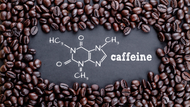How Much Caffeine in a Cup!!!!
Posted by Christelle Graham on Jul 11th 2019
People around the world start their morning with a cup of coffee. While a lot of what we talk about on the blog revolves around flavor and quality of coffee, there is another aspect of coffee that draws people to this magical elixir... Caffeine.
While coffee drinkers everywhere rely on this powerful compound, there is a lot of misunderstanding around it. We hope to clarify some of those details. If you understand the basics of caffeine you can optimize the benefits of it.
Caffeine in a nutshell is a stimulant. That is to say that caffeine has an uplifting effect on the human brain. It releases endorphins (feel good molecules) throughout the body and also increases alertness. Caffeine also has other interesting effects on the human body including increasing heart rate and peristalsis of the intestines (what makes us have the urge to go to the bathroom). As with anything, drinking caffeinated beverages should be done in moderation. An excessive amount of caffeine can cause side effects such as palpitations and general sense of anxiety.
So if the level of caffeine matters, you may want to know what the caffeine content is in a single cup of coffee... Right? Well, unfortunately, it isn't straight forward. There is a degree of variability in the amount of caffeine depending on a variety of factors including: roast type, bean type and brewing method. One of the common misconceptions is that the darker the roast, the stronger the coffee, thus the higher the caffeine content. While it is true that darker roasts present with very strong flavor notes, dark roast beans are roasted longer causing them to lose more water content. This is why dark roast beans are lighter and larger than light roast beans. Inversely, light roast beans are more dense and thus have a higher levels of caffeine by volume.
All that to say...
The lighter the roast, the higher caffeine content.
The other variable worth understanding is the brew method. Depending on how you brew your coffee, you caffeine content could be lower or higher. For example, typical brewed cup of coffee (8 oz.) using a conventional french press or coffee drip has approximately 250-300 mg of caffeine. Comparatively, a single shot of espresso has around 75 mg of caffeine. While espresso may be stronger by volume, you need to drink 3-4 shots of it before you reach the caffeine content of an average cup of coffee.
Lastly, let's talk about decaf. Decaffeinated coffee starts off as normal coffee beans and goes through a process to extract the caffeine. While the result is significantly less caffeine per cup of coffee, it is never 0% caffeine in decaffeinated coffee. That means if you are sensitive to the effects of caffeine, you still may feel the mild amount of caffeine in your coffee. The international standard for decaf coffee is a reduction of caffeine by 97%. So while it is a very small amount, you still may want to avoid decaf right before bed.

